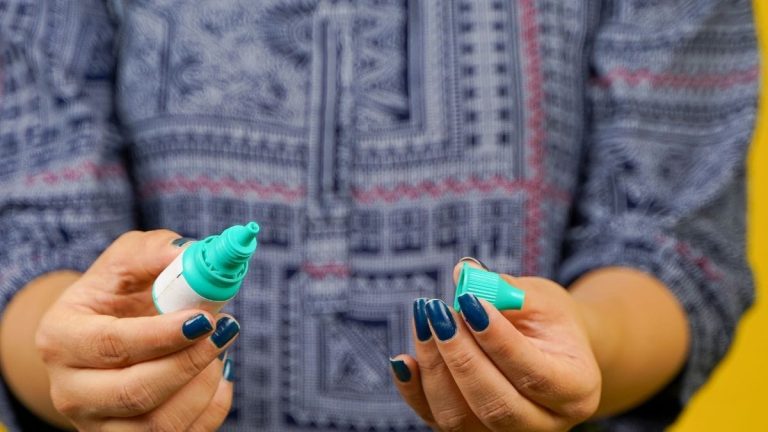
The drug is made from pilocarpine, which has been used to treat glaucoma for the past 75 years. (Representative via Getty Images)
Several ophthalmologists told News18 they would consider glasses as the preferred long-term solution because it would be impractical to refill eye drops. In addition, some side effects are associated with the use of this drug
This week, Mumbai-based Entod Pharmaceuticals launched eye drops that could eliminate the need for reading glasses. India's first eye drops that do not require reading glasses, PresVu, has received approval from the drug regulator after more than two years of review.
The drug has received commercial approval from expert committees and the Central Drugs Standard Control Organization (CDSCO) after submitting data from a Phase 3 clinical study in over 270 patients.
Entod Pharmaceuticals Chief Executive Officer (CEO) Nikkhil K Masurkar earlier told News18 in an exclusive interview that the drug will hit the shelves in October and will become a prescription drug.
The drug is promoted as a solution for getting rid of reading glasses. However, multiple eye experts told News18 that in real-life scenarios, replacing glasses with reusable eye drops may not be a good idea in the long run. They say the drops can provide a stopgap solution but are not a lifelong solution or a panacea.
How does this medicine work?
The drug is made from pilocarpine, which has been used to treat glaucoma for the past 75 years.
This drug treats presbyopia by reducing the size of the pupil, which helps to see close objects clearly. Presbyopia is an age-related decrease in the eye's ability to focus on nearby objects, which usually becomes apparent around the 40s and worsens around the late 60s.
In a healthy eye, the clear lens behind the iris adjusts its shape to focus light on the retina, creating clear vision for nearsighted tasks. This accommodation is the ability of the natural lens in the eye to change its focusing ability to see objects clearly.
This adjustment reaches its maximum when young, but decreases with age, requiring near-wear glasses with convex lenses to see small text at 33/40 cm. These eye drops improve visual clarity by adjusting the pupils, creating a “pinhole effect,” increasing depth of field and improving the ability to focus on nearby objects.
Abroad, there are some drugs to treat presbyopia, such as Oasis Pharmaceuticals' Qlosi and AbbVie's VUITY approved by the United States Food and Drug Administration (US FDA). In 2021, VUITY became the world's first and only eye drop approved by the FDA for the treatment of presbyopia.
Experts: This is not a long-term solution
One drop takes just 15 minutes to take effect, and its effects last for the next 6 hours. If you pour the second drop three to six hours after the first, the effects will last longer, up to nine hours.
Dr. Rohit Saxena of the Rajendra Prasad Center for Ophthalmic Sciences at the All India Institute of Medical Sciences in New Delhi said these eye drops are beneficial in the short term but do not provide a long-term solution.
“This is a temporary solution to reading problems because the effect of the drug will last 4-6 hours and will require 1-2 drops per day for life,” he said.
“I still think glasses are the preferred long-term solution because medications also have some side effects, including blurred distance vision, headaches and rare retinal detachments.”
Dr Digvijay Singh, director of the ophthalmology department at Narayana Super Specialty Hospital in Gurgaon, said using these eye drops is like whipping a tired horse. “The horse will run a little, but eventually he will tire.”
“Again, the drops will help for a while, but eventually the weak muscles will fatigue and you'll need glasses,” he said, adding that the drops can be used as a “stopgap measure” but not as a “treat”.
Dr. Samir Sud, co-founder and director of Sharp Sight Eye Hospital, believes lifelong use of these eye drops is a bit “impractical” and the success of the drugs in clinical trials is only half the battle.
“We need to wait and see how the drug performs when it is used by the general public. Also, you need to keep reusing the drops to have its effect, which is very impractical because it is not a one-time solution.
Sud explains that there are many other practical solutions, such as multifocal lenses, that achieve the same effect. “Only time will tell whether these eye drops are suitable for daily use.”
